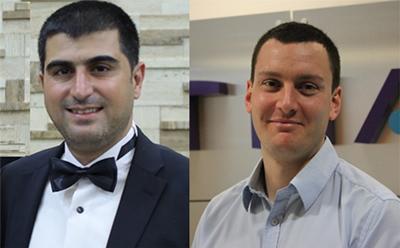Fellowships strengthen Southampton’s strong links with industry partners

The University of Southampton’s established reputation for working with industry has been enhanced with the award of two Industrial Fellowships by the Royal Academy of Engineering.
Dr Basel Halak, a renowned researcher and educator in Southampton’s School of Electronics and Computer Science, has been awarded his second successive Industrial Fellowship with security experts Arm Holdings. He will focus on Artificial Intelligence-enhanced design for secure, anti-tamper embedded devices.
Coming into the University as an ‘Industry to Academia’ Fellow is Ben Pritchard, Research Group Leader for Autonomous Systems at global technology leader Thales, who in partnership with Southampton, seeks to prove how the technology can transform the maritime sector. He will concentrate on Integrated Mission Management for Autonomous Systems through his 16-month Fellowship.
This latest round of Industrial Fellowships marks a new direction for the Royal Academy, with Industrial Fellows being embedded into academic institutions for the first time, as well as the traditional approach of academic researchers being placed in an industrial environment to transfer their knowledge.
Dr Halak, director of the Embedded Systems and IoT (Internet of Things) programmes at Southampton, has an international reputation for creating and delivering courses and research on securing embedded systems. His research expertise includes the evaluation of security of hardware devices, the development of appropriate countermeasures, the development of mathematical formalism of reliability issues in CMOS circuits (e.g. crosstalk, radiation, ageing), and the use of fault tolerance techniques to improve the robustness of electronics systems against such issues.
With the growth of the IoT, embedded systems have become targets for hackers with smart devices prone to be taken over and controlled. During his previous Industrial Fellowship with Arm, Dr Halak worked on developing secure and reliable electronic systems by improving robustness against attacks. This latest Fellowship will see him further develop responsive and adaptive defence mechanisms to ward off unwanted security threats.
“Compromised hardware products pose serious threats if used in critical infrastructure and military applications,” said Dr Halak. “This continuously evolving landscape of security threats, calls for equally effective and adaptive defence mechanisms. This project will develop such a mechanism, using machine learning algorithms to achieve a rapid detection of malicious behaviours in an embedded system and intercede more quickly to stop a potential attack.”
Ben Pritchard, one of the company’s leading researchers in autonomy, has played an important role in demonstrating complex operations involving multiple autonomous vessels to be run at squad level, in order to address these challenges.
The research will understand how human supervisors can best interact with squads of mixed maritime autonomous systems (in the air, on the surface and under the water) to maximise human-system team performance.
“This Fellowship will allow me to expand my role in an existing research partnership between Thales UK and the University of Southampton,” Pritchard explained. “We have completed an ambitious first year of joint research during 2019 with phase two now ramping up into 2021.
“The work focuses on the creation of an experimental cyber-physical platform through which we can conduct new research,” he continued. “It's known as the Integrated Mission Management System and allows us to bring together a variety of autonomous assets that Southampton already own and connect them together as a heterogeneous squad to deliver a shared, collaborative capability to satisfy high level objectives.”
Dr Jon Downes, Lecturer in Ship Science and Engineering who is also the Employability and Industrial Liaison for Southampton’s Ship Science degree courses, said: “Working with Thales, enables us to build a common understanding of industrial needs and for my research to be focused on the areas that are fundamental challenges to the sector. Working with Ben through this fellowship will strengthen this common understanding and continue to develop the strategic partnership.”
To enhance the learning exchange, Pritchard will also play a role in helping the University to enhance its curriculum, mentor PhD students, support relevant student societies and undertake shared outreach activities. He will also connect the University to Thales’s wider network of key stakeholders that are leading on research and development, such as Thales CortAIx, one of the world's leading Artificial Intelligence ecosystems based in Montreal.